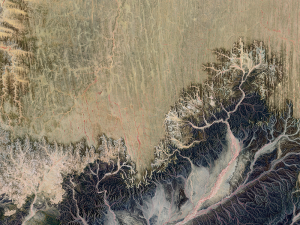Entropocene Research Seminar
Reconsidering the Biosphere and the Technosphere in the Entropocene
Entropies, Economies, Ecologies, Technologies

Transdisciplinary Research Seminar Series
September 2022 – July 2023 (online)
Environmental Justice Program (Georgetown University)
Center for Critical Technology Studies (University of Silesia)
Centre for the Anthropology of Religion and Cultural Change (Universita Cattolica Milano)
Research Network for Philosophy and Technology
Paris 8 University – University of Silesia- Georgetown University – Universita Cattolica Milano – City Univerity of Hong Kong
Organisation : Anne Alombert, Chiara Giaccardi, Gaël Giraud, Michał Krzykawski, Mauro Magatti, Yuk Hui, Daniel Ross.
Contacts : anne.alombert@univ-paris8.fr / michal.krzykawski@us.edu.pl
Recordings of the sessions at this link.
The Anthropocene is a new geological epoch in which human disturbances are having an impact, on the whole Earth, understood as a complex system. Confronted with the Anthropocene, modern humans, who have through their exosomatic (and now hyper-industrial) activities transformed and harmed the biosphere, are certainly no longer “masters and possessors of nature” : on the contrary, it is now the technosphere itself, as a planetary network of technical systems, that seems to occupy the driver’s seat on many interrelated scales.
In Bifurcate: “There is No Alternative”, a book edited by philosopher Bernard Stiegler with the Internation Collective in 2021, it is claimed that the Anthropocene can be termed an Entropocene, as it corresponds to increasing rates of entropy production in all its forms: thermodynamic entropy (the degradation of energy), biological entropy (the reduction of biodiversity), informational entropy (the reduction of knowledge to information and computation, which incidentally gives rise to negative effects that can themselves be defined as psychic and social entropies).
Departing from the opposition between technological humankind and nature, Stiegler’s diagnosis encourages us to reconsider the relationship between various phenomena found in the technosphere: on the one hand, the depletion of resources, the destruction of ecosystems and the reduction of biodiversity under the effect of extractivist capitalism based on the exploitation of fossil fuels; on the other hand, the disruption of institutions, the destruction of cultures and the reduction of noodiversity under the effect of computational capitalism based on the exploitation of data.
In such a context, the challenges of achieving ecological and technological transitions can no longer be addressed separately. Instead, a transversal approach to these overlapping phenomena is required: different modes of understanding must be brought together, beyond the rift between “hard” and “soft” sciences, in order to bring the question of entropy into focus in the context of the Entropocene.
Since the beginning of the 20th century, “that eminently abstract concept of entropy” has proved to be problematic and posed many theoretical difficulties: from thermodynamics in physics, as well as in biology, information theory and economics, and up to complex systems science, a series of misunderstandings seems to have shaped the interpretation and understanding of this concept.
Given our current situation, an interscientific understanding of entropy should be adopted, aiming at a reconsideration of its meaning and significance, not only from a thermodynamic viewpoint grounded in physics, but also in relation to perspectives emerging from ecology, theoretical biology, anthropology, technology, sociology, economics and political theory.
This seminar series seeks to encourage an interscientific debate on entropy with the aim of :
1. shedding new light on the underlying epistemic issues related to the interpretation of this concept,
2. offering a transdisciplinary understanding of the multidimensional disorder now under way,
3. opening new perspectives for the future of/in the “entropocenic” technosphere.
|
PROGRAM . 20 September 2022 – Contributory Economy in the Entropocene Anne Alombert and Michal Krzykawski Bibliography : B. Stiegler, “Sortir de l’Anthropocene”, Multitudes, 2015. B. Stiegler et al., Bifurcate. There is no alternative, Open Humanities Press, 2020. A. Alombert et M. Krzykawski, “Vocabulaire de l’internation”, Appareil, 2021. . 10 October 2022 – Entropy, Anti-entropy and the Living Giuseppe Longo and Marie Chollat-Namy Bibliography : G. Longo and F. Bailly, “Biological organization and anti-entropy”, Journal Biological Systems, Vol. 17, No. 1, pp. 63-96, 2009 . 22 November 2022 – Supersociety and Social Generativity Chiara Giaccardi and Mauro Magatti Bibliography : C. Giaccardi and M. Magatti, Supersocieta, Mulino, 2022. . 20 December 2022 – Ecological Economics and Economy of the commons Mario Giampietro and Gaël Giraud Bibliography : Gaël Giraud, “Pour une économie du vivant”, conférence, 12 janvier 2022. . 24 January 2023 – The Age of Sustainability : just transitions in a complex world Mark Swilling Bibliography : . 21 February 2023 – Carbon and Silicon. Reframing the Technosphere and the Noosphere Dan Ross and Pieter Lemmens Bibliography : Pieter Lemmens, “Re-Orienting the Noosphere”, Glimpse, Volume 19, 2018. Daniel Ross, Psychopolitical Anaphylaxis. Steps towards a metacosmics, Open Humanity Press, 2020. . 11 April 2023 – Entropy and Information in Cybernetics and AI David Bates Bibliography : David Bates, séminaire “Information et entropie”, 2018. . 22 May 2023 – The politics of energy : fossil fuels, thermodynamics and petro-masculinity Cara Daggett Bibliography :
|
